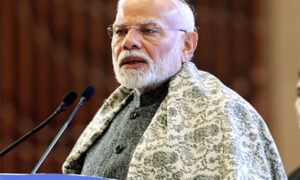
US defence giant Lockheed Martin and India’s Tata group signed an agreement on Monday to jointly build the F-16 Block 70 fighter in India, should New Delhi opt for the American aircraft in the procurement of single-engine fighters for its air force.
Highlighting the importance of this contract for the Tata group’s aerospace and defence aspirations, Chairman Emeritus Ratan Tata attended the signing ceremony at the ongoing Paris Air Show in France.
According to a news report in the Economic Times, The Tata group has earmarked Tata Advanced Systems Ltd (TASL) to build the F-16 in India with technology and manufacturing facilities transferred from Lockheed Martin.
Coming ahead of Prime Minister Narendra Modi’s visit to the United States this month, Lockheed Martin’s inking of this joint venture (JV) – which would have required formal clearance from Washington – indicates that, despite President Donald Trump’s promises to keep skilled jobs in the US, his administration is willing to transfer the ageing F-16 production line from Texas to India.
TASL and Lockheed Martin already have a joint venture (JV) that manufactures airframe components in Hyderabad, including for the C-130J Super Hercules airlifter and the Sikorsky S-92 helicopter.
However, the manufacture of F-16 Block 70 would be a far more ambitious project. This would first require the Ministry of Defence (MoD) to select the Tata group as an Indian “strategic partner” for aircraft production. Next, the IAF and the MoD would have to choose the F-16 Block 70 as the air force’s single-engine fighter aircraft. That multi-billion dollar procurement has already kicked off with the issue of a global request for information (RFI) by the IAF.
MoD and IAF sources confirm aviation market intelligence that the IAF’s chosen fighter is likely to be either the F-16 Block 70, or the Gripen E fighter that Swedish company, Saab, has offered to India.
In case the IAF opts for Saab’s Gripen E, the role of Indian partner is likely to fall to the Adani group, say senior Saab executives. The Adani group, despite its lack of experience in defence or aerospace, is positioning itself to be chosen as a “strategic partner” for this purpose. Lockheed Martin expects the IAF will choose the F-16, based on the calculation that transferring the world’s only F-16 production line to India “creates new manufacturing jobs in India, and positions Indian industry at the centre of the most extensive fighter aircraft supply ecosystem in the world”, as a company release stated on Monday.
Lockheed Martin points out that over 4,500 F-16s have been built since the 1970s, of which approximately 3,200 fighters remain in operational service in 26 countries. An Indian production line could expect to benefit from their custom, including from the Pakistan Air Force.


















